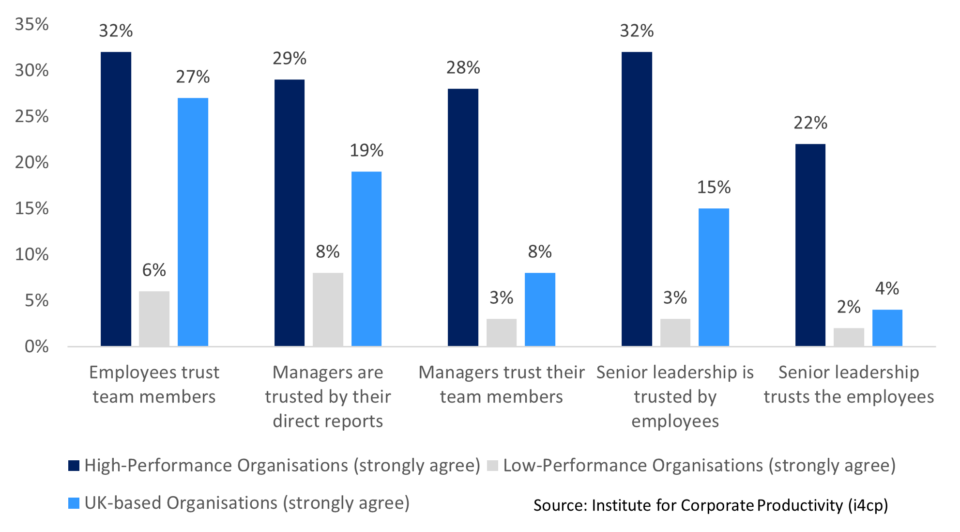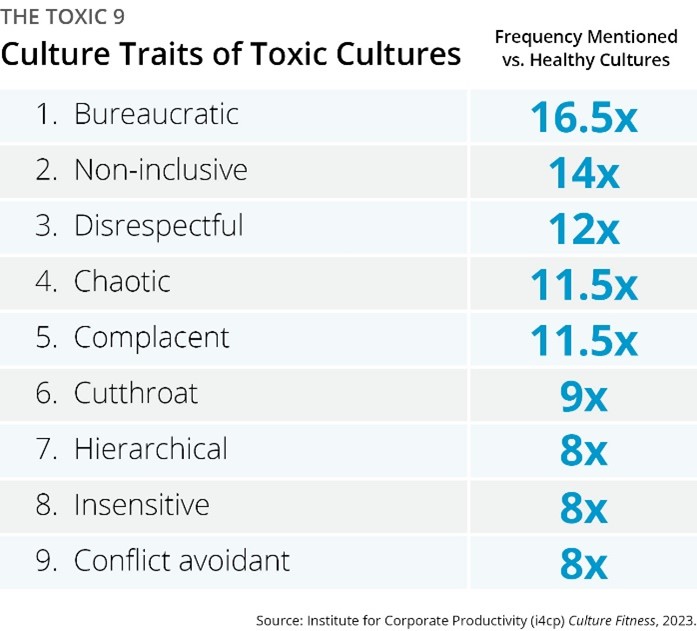Why trust matters to productivity: A call to action for UK employers
How much emphasis does your organisation place on trust as a factor of its productivity? Kevin Martin, Chief Research Officer at the Institute for Corporate Productivity (i4cp), a US-based human capital research firm, writes about this important yet often overlooked or under-emphasised element, especially among UK employers.
In The Value of Trust, published by the British Council, the authors wrote, “Numerous studies indicate the dividends of trusting relationships. Some show that at the least, trust is robustly related to economic growth, and at most that the relationship between trust and growth is statistically significant.”
Those assertions are validated by global research conducted by the Institute for Corporate Productivity (i4cp). In one study, analysis revealed that trust accounted for up to 18% of the variance in the productivity of organisations during the pandemic. The study also found that trust is a major determinant of an organisation’s culture health. This is significant because in other i4cp research, culture health was found to be a major determinant of organisational productivity and accounted for up to 20% of said variance during the pandemic—(Figure 1).
Figure 1 – Path Analysis for Productivity

Note: In the i4cp report, Culture Fitness: Healthy Habits of High-Performance Organizations, analysts note that among those organisations whose employees rated their cultures as “very healthy” the following cultural traits are most common: employee-focused, inclusive, quality, learning, innovative, and collaborative.
The theme of the 2024 Annual Meeting of the World Economic Forum in Davos, Switzerland, was Rebuilding Trust, with the aim “to restore collective agency, and reinforce the fundamental principles of transparency, consistency, and accountability among leaders.”
Clear and consistent focus on building and maintaining high levels of trust is essential to organisational agility, resiliency, and viability. Consider the following scenarios and implications on trust for each:
- Labour strikes: Would UK’s nurses, teachers, postal workers, bus drivers, and rail workers strike if they trusted their employers to pay and treat them fairly? In tight labour markets and high-inflation economies, ensuring both competitive and fair pay is an imperative. How an employer treats its workers is a direct reflection of its culture. High-performance organisations emphasise culture over compensation.
- Return to office mandates: Do CEOs really believe that being in an office is key to increasing innovation and productivity, or do they not trust their people to get work done when working from home? What sort of messages do inflexible mandates send?
- AI and the future of work: What are employers doing to quell the anxiety workers have about the potential of being replaced by AI, and educate and equip their workers for an AI-enabled future of work?
- Geopolitical, economic, social, and environmental issues and events: Each of these can be sources of stress, anger, anxiety, and distrust among employees. Do employees trust that their employers have their well-being in mind? Also, do employers listen to their workers and actively engage them in dialogue about issues that are affecting them? Do employers have clear and transparent policies when it comes to whether or not they make a statement on such issues?
The Trust Index: A Key Metric for Organisational Success
In creating its Trust Index, i4cp considered five important instances of trust across organisations. Each was found to have strong positive correlations to increases in organisational market performance, the ability to consistently achieve organisational goals, and to culture health. Two instances (employee trust in senior leadership and trust in their direct managers) were also found to be strongly associated with fewer instances of employee burnout:
- Employees trust their team members
- Managers are trusted by their direct reports
- Managers trust their team members
- Senior leadership is trusted by employees
- Senior leadership trusts the employees
In each instance, respondents from high-performance organisations (compared to those from low-performance organisations) were 3.5 to 11 times more likely to strongly agree that trust existed across their companies. This kind of omni-directional trust plays a significant role in raising organisational productivity, yet it’s hard to establish. Less than one-third of those surveyed from high-performance organisations claimed such trust exists, yet far fewer of those based in the UK reported the same about their organisations—(Figure 2).
Figure 2 – Comparison of Organisational Trust: UK-based Employers

Note: Designations of high-performance organisations (HPOs) and low-performance organisations (LPOs) are based on all data collected from survey respondents who work at organisations around the world with at least 1,000 employees, which may or may not include employers from the UK. HPOs comprise the upper quartile of organisations in any given i4cp study, with the strongest multi-year growth in a Market Performance Index (revenue, profit, customer satisfaction, and market share). LPOs comprise the bottom quartile of organisations in those performance indicators. The UK bar includes only UK-based organisations.
The State of Trust in the UK
Analysis of the responses of participants surveyed by i4cp who represented UK-based organisations found that omni-directional trust is a problem across most UK-based employers. In particular, instances of top-down and bottom-up trust are rare:
- Senior leaders and managers don’t trust employees: Only 8% or less of UK-based employers indicate that senior leadership and/or managers have high degrees of trust in their employees. This is especially notable, as according to i4cp research, organisations with toxic cultures are 10 times more likely than those with very healthy cultures to flag this as an issue they struggle with (4% vs. 41%).
- Employees don’t trust senior leadership: Fewer than 20% of those surveyed from UK-based organisations claim their employees have a very high degree of trust in either their direct supervisors or in senior leadership. This is especially worrisome, as other i4cp research has revealed that those representing organisations with toxic cultures are 16 times more likely to cite a lack of employee trust in senior leadership than those with very healthy cultures (4% vs. 66%).
Such trust is greatly lacking in organisations with toxic culture health. I4cp research has revealed several traits that are up to 16.5 times more likely to be associated with toxic cultures as opposed to culture health – (Figure 3). These work environments are disorganised and chaotic – both of which contribute to employees feeling overwhelmed by so many change initiatives and unclear priorities.
Figure 3: Culture Traits of Toxic Cultures

Decision making in organisations with toxic culture health can often be layered in bureaucracy and isolated to those in charge while perspective among employees is rarely sought or considered and suffer from significant process delays. This breeds a sense of distrust across the organisation – among leaders of their employees, and employees of leadership – as well as limited psychological safety.
As a result, gossip and talking behind one’s back, among other disrespectful behaviours, often occur. Toxic cultures can also mask themselves in environments that are overly friendly where underperformance is not addressed to avoid any conflict.
Building Trust: A Call to Action
The encouraging news is there are several actions employers can take to boost trust across their organisations:
- Model organisational values consistently
This was found to have the highest positive correlation to both culture health and trust. Ensure that the organisation promotes and rewards leaders who consistently model its values. - Reward and recognise the how of goal achievement
High-performance organisations are four times more likely than low-performance organisations (35% vs. 9%) to place high emphasis on how goals are achieved, not just the achievement itself. - Hold people leaders accountable for employee outcomes
Trust grows in abundance when leaders are held accountable for delivering people outcomes (e.g., high engagement, low undesired attrition, strong internal mobility). Positive business outcomes result as well. - Offer flexibility
Not only the where of work, but also the when and what of work to enhance work-life balance and improve the company’s reputation as an employer. - Train people leaders on soft skills
Empathy and productivity must not be mutually-exclusive. High-performance organisations are up to three times more likely than low-performers to provide ample training to leaders on helping others set clear goals, delivering effective coaching to others, and providing quality feedback. - Empower employees
Providing individuals and work teams with high levels of autonomy, for example, has very strong positive correlation to trust. Goal clarity and accountability – both of which have strong positive correlations to trust and culture health – are also key to instilling managers with the confidence to allow greater autonomy. - Listen to workers and act on what you hear
Determined, consistent, and transparent collecting of employee sentiment from a diverse array of employees across the business. Make sure to communicate what you heard, what you plan to act on (and not), and your progress.
Leaders who overlook or underestimate the role of trust and organisational culture health as integral to their productivity equation are short-changing their shareholders, their workers, and the ecosystems in which they operate.
Leaders in Human Resources and CEOs of UK-based large companies should prioritize and cultivate a culture of trust, paving the way for enhanced productivity, agility, resilience, and success.
- Download The Productivity Predicament executive brief for free



